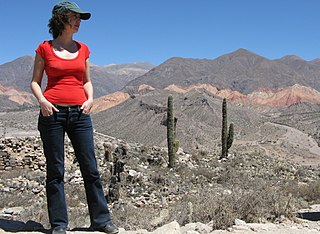Related Research Articles
David Holmgren is an Australian environmental designer, ecological educator and writer. He is best known as one of the co-originators of the permaculture concept with Bill Mollison.

Ethnobotany is an interdisciplinary field at the interface of natural and social sciences that studies the relationships between humans and plants. It focuses on traditional knowledge of how plants are used, managed, and perceived in human societies. Ethnobotany integrates knowledge from botany, anthropology, ecology, and chemistry to study plant-related customs across cultures. Researchers in this field document and analyze how different societies use local flora for various purposes, including medicine, food, religious use, intoxicants, building materials, fuels and clothing. Richard Evans Schultes, often referred to as the "father of ethnobotany", provided an early definition of the discipline:
Ethnobotany simply means investigating plants used by primitive societies in various parts of the world.
Howard Thomas Odum, usually cited as H. T. Odum, was an American ecologist. He is known for his pioneering work on ecosystem ecology, and for his provocative proposals for additional laws of thermodynamics, informed by his work on general systems theory.
Emergy is the amount of energy consumed in direct and indirect transformations to make a product or service. Emergy is a measure of quality differences between different forms of energy. Emergy is an expression of all the energy used in the work processes that generate a product or service in units of one type of energy. Emergy is measured in units of emjoules, a unit referring to the available energy consumed in transformations. Emergy accounts for different forms of energy and resources Each form is generated by transformation processes in nature and each has a different ability to support work in natural and in human systems. The recognition of these quality differences is a key concept.

Colin Peter Groves was a British-Australian biologist and anthropologist. Groves was Professor of Biological Anthropology at the Australian National University in Canberra, Australia.

Ethnobiology is the multidisciplinary field of study of relationships among peoples, biota, and environments integrating many perspectives, from the social, biological, and medical sciences; along with application to conservation and sustainable development. The diversity of perspectives in ethnobiology allows for examining complex, dynamic interactions between human and natural systems.
Overton Brent Berlin is an American anthropologist, most noted for his work with linguist Paul Kay on color, and his ethnobiological research among the Maya of Chiapas, Mexico.

Robert Howard GrubbsForMemRS was an American chemist and the Victor and Elizabeth Atkins Professor of Chemistry at the California Institute of Technology in Pasadena, California. He was a co-recipient of the 2005 Nobel Prize in Chemistry for his work on olefin metathesis.

Ethnomycology is the study of the historical uses and sociological impact of fungi and can be considered a subfield of ethnobotany or ethnobiology. Although in theory the term includes fungi used for such purposes as tinder, medicine and food, it is often used in the context of the study of psychoactive mushrooms such as psilocybin mushrooms, the Amanita muscaria mushroom, and the ergot fungus.
Ethnoecology is the scientific study of how different groups of people living in different locations understand the ecosystems around them, and their relationships with surrounding environments.
Darrell Addison Posey was an American anthropologist and biologist who vitalized the study of traditional knowledge of indigenous and folk populations in Brazil and other countries. He called his approach ethnobiology and combined research with respect for other cultures, especially indigenous intellectual property rights.

William Balée is a professor of anthropology at Tulane University in New Orleans, Louisiana.
Joe G. N. "Skip" Garcia is an American pulmonary scientist, physician and academician.

Aechmea magdalenae is a flowering plant in the Bromeliaceae family. It is also known as ixtle. This species is native to Central America, southern Mexico, Colombia and Ecuador. The specific epithet magdalenae comes from the place it was discovered, the Rio Magdalenae Valley in Colombia. The long green leaves feature fierce spines and may reach about 2.5 meters tall. In nature, it is found in moist and swampy woods. The flowers are red and give way to edible fruits.
Maurice Mmaduakolam Iwu is a Nigerian professor of pharmacognosy and the chairman of Independent National Electoral Commission (INEC) from June 2005 to April 2010.

Chandra Prakash Kala is an Indian ecologist and professor. His research interests include alpine ecology, conservation biology, indigenous knowledge systems, ethnobotany and medicinal aromatic plants. He is an assistant professor in the faculty area of Ecosystem and Environment Management at the Indian Institute of Forest Management.
Gary John Martin is an American anthropologist, ethnobotanist and conservationist, known for his 1995 book Ethnobotany: a methods manual, which has been translated into Bahasa Melayu, Mandarin and Spanish.

Rigoberto Hernandez is an American chemist and academic. He is The Gompf Family Professor at the Johns Hopkins University and was formerly a board member of the American Chemical Society (ACS). Before his appointment at Johns Hopkins, Hernandez spent 20 years as a faculty member at the Georgia Institute of Technology, where he became a full professor. In addition to his work as a professor, Hernandez is the director of the Open Chemistry Collaborative in Diversity Equity, a program dedicated to creating more diversity in academia. Hernandez will serve at the President of the American Chemical Society in 2026.

Ina Vandebroek is an ethnobotanist working in the areas of floristics, ethnobotany and community health. Since 2005, she has worked at the New York Botanical Garden in the Institute of Economic Botany. She has worked on ethnobotanical projects in North America, the Caribbean, and South America.

Rainer W. Bussmann is a German botanist and vegetation ecologist, specializing in ethnobotany and ethnobiology, wild food plants, wild crop relatives, climate change, gastronomic botany and preservation of traditional knowledge in the Andes, the Caucasus and the Himalayas. He has worked at the University of Bayreuth, University of Hawaii, University of Texas, the Missouri Botanical Garden, Ilia State University and the State Museum of Natural History Karlsruhe; he has founded several international non-governmental organizations, including Nature and Culture International, Saving Knowledge, and Ethnomont.
References
- ↑ "Pulse of the Planet – the sound".
- ↑ Roach, John (2005-05-03). "Wonder Drugs Waiting in the Weeds?". Archived from the original on 2005-05-04.
- ↑ "Study: Weeds Make the Best Medicine". ABC News .
- ↑ "Medicinal Weeds". www.acfnewsource.org. Archived from the original on 2002-06-15.